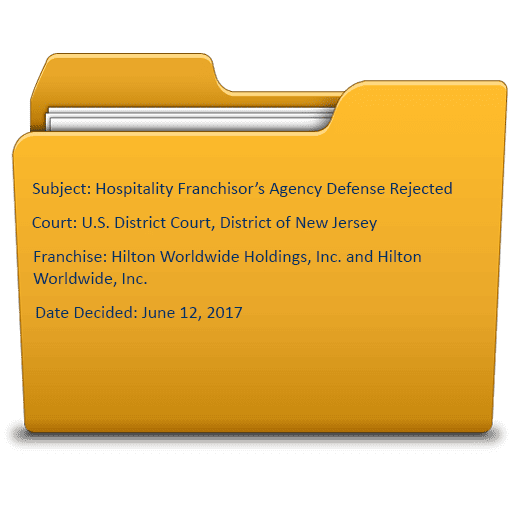 This decision underscores the inherent problem with using the franchise business model in the hospitality industry. The hospitality Franchisor typically sets very high standards of service for the Franchisee, so as to protect its brand in a very competitive market. Yet, this very strict adherence to systems and operations often leads the Franchisor to assuming joint liability with its Franchisee. This issue often comes up in personal injury cases (i.e. the horribly hot tub injury to a child), but here is an instance where the Franchisor, along with the Franchisee, were sued by a plaintiff alleging that defendants committed negligence, fraud, negligent misrepresentation, and unjust enrichment by allowing a former employee of plaintiff an extended stay at a Hilton branded hotel which was charged to plaintiff’s corporate account.
This decision underscores the inherent problem with using the franchise business model in the hospitality industry. The hospitality Franchisor typically sets very high standards of service for the Franchisee, so as to protect its brand in a very competitive market. Yet, this very strict adherence to systems and operations often leads the Franchisor to assuming joint liability with its Franchisee. This issue often comes up in personal injury cases (i.e. the horribly hot tub injury to a child), but here is an instance where the Franchisor, along with the Franchisee, were sued by a plaintiff alleging that defendants committed negligence, fraud, negligent misrepresentation, and unjust enrichment by allowing a former employee of plaintiff an extended stay at a Hilton branded hotel which was charged to plaintiff’s corporate account.
Somewhat comically, the plaintiff’s employee was authorized to stay on the franchise property for just five days. Instead, she ended up living on the property for fourteen months, running-up an $82,883.00 bill.
The plaintiff joined the Franchisor in the lawsuit, who in turn filed a motion to dismiss relying upon the Franchise Agreement’s (FA) terms concerning agency; specifically, arguing that it had no liability because the Franchisee was an independent contractor. The Court responded by noting that it was all well and good that the FA shifted liability to the Franchisee, but this did not settle the issue. Instead, the Court looked closely at control exercised by the Franchisor over the Franchisee as the determinative factor.
The Court found evidence of extensive control by Hilton. As laid-out in its manual, Hilton retained control over many aspects of the Hotel’s operations including day-to-day operations, such as: (1) Franchisee did not have the authority to make its own personnel decisions; (2) Franchisee was required by Hilton to hire a preapproved management company; (3) Franchisee’s hotel managers had to be approved by Hilton, and all management employees were required to attend Hilton training programs. Most damaging for Hilton was the fact that (4) Hilton retained direct control over the reservation processing and payment system at the hotel; whereby, it delineated highly specific rules and procedures for reservation processing and payment, which the Franchisee was required to satisfy per the terms of the FA. This was very the system at issue in the action.
Hilton’s motion to dismiss was denied.
Please see my previous blog on this critical control issue: https://www.kilcommonslaw.com/franchise/the-franchisors-dilemma-to-control-or-not-to-control/
Citation: eTeam, Inc., Plaintiff, v. Hilton Worldwide Holdings, Inc., Hilton Worldwide, Inc., Defendants, 2017 U.S. Dist. LEXIS 89641
BE ADVISED that these comments are not intended as legal opinions and are not to be relied upon as legal advice. If you need franchise-related legal advice, please contact us to discuss the specifics of your franchise business.
© KilcommonsLaw, P.C. 2017
